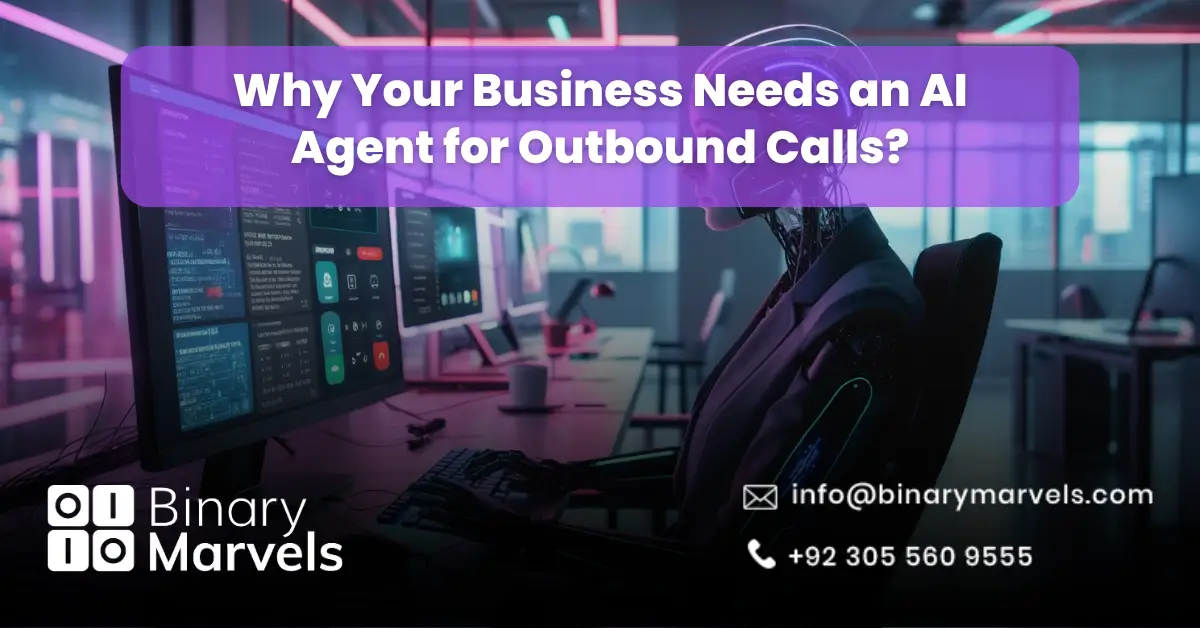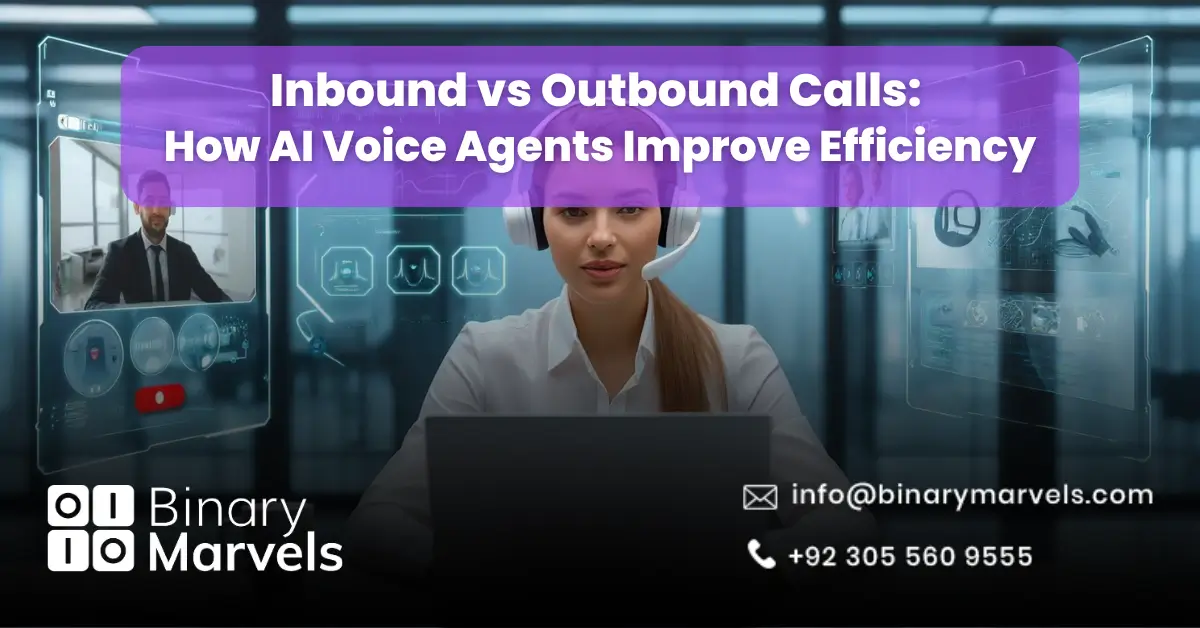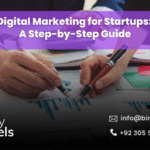
In today’s hyper-competitive business landscape, speed, personalization, and scale aren’t just advantages—they’re survival tools. Whether you’re running a fast-paced call center, a growing B2B startup, or a national sales operation, outbound calling still plays a critical role in generating leads and building customer relationships.
But here’s the catch: relying solely on human agents for outbound calls can be expensive, inconsistent, and—let’s be honest—inefficient. That’s exactly where AI agents for outbound calls come in. Powered by voice AI and natural language processing (NLP), these smart agents don’t just automate cold calls—they transform how businesses connect with potential customers, qualify leads, and close deals.
In this blog, we’ll break down exactly what AI calling agents are, why businesses are rapidly adopting them, and how they deliver real-world ROI. From increased efficiency to scalable growth, you’ll see why the future of outbound communication belongs to AI—and how your business can benefit today.
Also Read: Top 10 AI Companies in Pakistan
Understanding AI Agents in Outbound Calling
What Is an AI Agent?
An AI agent for outbound calls is a software-powered virtual assistant that uses natural language processing (NLP), machine learning (ML), and speech synthesis to handle phone conversations with leads or customers—without human intervention. These agents are designed to simulate human-like conversations, respond in real time, and adapt to the context of the interaction.
Unlike traditional auto-dialers or robocalls, AI agents are smart enough to engage in two-way conversations, handle objections, answer common questions, and even schedule follow-ups—just like a trained sales rep would.
How AI-Powered Agents Differ from Traditional Dialers
Let’s be clear: this isn’t just a fancier robocall system. AI calling agents bring an entirely new level of intelligence and responsiveness to outbound communication. Here’s how they differ:
| Feature | Traditional Dialer | AI Calling Agent |
|---|---|---|
| Interaction | One-way (pre-recorded) | Two-way conversation |
| Personalization | Very limited | Highly personalized using CRM data |
| Objection Handling | None | Dynamic, real-time responses |
| Availability | Limited by workforce | 24/7, non-stop calling |
| Learning | Static scripts | Self-improving via ML models |
This leap in capability enables AI agents not only to contact leads, but also to qualify and convert them.
Also Read: A Guide to AI Voice Agent Development
Core Technologies Behind AI Agents
To understand what makes these agents so effective, let’s take a look under the hood:
- Natural Language Processing (NLP): Enables the AI to understand and respond to human language in real-time.
- Automatic Speech Recognition (ASR): Converts spoken words into text so the AI can process and react appropriately.
- Text-to-Speech (TTS): Turns AI responses into natural-sounding human voice output.
- Machine Learning: Helps the AI improve over time based on past call outcomes, customer behaviors, and interaction patterns.
- CRM/Database Integration: Allows AI agents to personalize messages and take action, such as logging notes or setting appointments.
These technologies combine to create human-like, high-converting outbound calls at scale.
Key Reasons Businesses Are Shifting to AI Agents
As outbound communication grows more competitive, businesses are realizing that traditional approaches can’t keep up. Here’s why more companies—from startups to enterprise call centers—are switching to AI agents for outbound calls.
1. Cost-Efficient Operations and 24/7 Availability
Hiring and training outbound calling teams is expensive—and keeping them available around the clock is even costlier. AI voice agents can run 24/7, make thousands of calls simultaneously, and never ask for a break. This dramatically reduces operational costs while increasing coverage and responsiveness.
With no need for salaries, shift scheduling, or overtime pay, businesses can scale without increasing headcount—a major win for profitability.
2. Hyper-Personalized Interactions at Scale
Unlike robocalls that deliver the same script to everyone, AI agents can pull real-time data from CRMs, purchase history, or lead forms to tailor each conversation. This level of personalization builds trust and improves engagement rates.
Example: Instead of saying, “Hi, I’m calling about your insurance,” an AI agent could say, “Hi John, I noticed you requested a quote for auto coverage last week—can I walk you through the options?”
3. Error-Free, Real-Time Communication
Human agents can get distracted, make mistakes, or go off-script. AI agents, on the other hand, follow predefined logic paths while still adapting to what the lead says. This results in consistent, accurate communication that complies with brand tone, sales goals, and regulatory guidelines.
They never forget a pitch, fumble words, or say the wrong thing—giving businesses better control over quality assurance.
Also Read: Revamp Your Call Center with VICIDial Development Services
4. Boosted Lead Qualification and Conversion Rates
AI agents don’t just make calls—they qualify leads in real-time based on predefined criteria like budget, interest, or timeline. Leads that meet your criteria can be automatically routed to live sales reps, while others can be nurtured or discarded.
This makes your human sales team laser-focused on hot leads, increasing conversions and cutting down wasted time.
5. Unlimited Scalability with Minimal Human Intervention
Whether you’re dialing 50 or 5,000 prospects, AI agents scale effortlessly. Businesses no longer need to hire more agents or invest in expensive infrastructure to handle surges in outbound volume.
This is especially beneficial for seasonal campaigns, promotions, or rapid-growth phases where speed-to-lead is critical.
6. Faster Follow-Ups and Intelligent Call Routing
Speed matters. The faster you respond to a lead, the higher the chance of conversion. AI agents can follow up within seconds of a form submission and transfer qualified leads to human agents without delay.
Some advanced systems even route calls based on lead type, language preference, or intent, ensuring that each call lands in the right hands.
7. Consistent Compliance and Quality Assurance
Outbound calling is full of regulations: Do-Not-Call lists, TCPA compliance, GDPR rules—you name it. AI agents can be programmed to adhere to all legal frameworks, with automatic updates to scripts and logic as rules evolve.
Plus, every interaction can be logged, recorded, and analyzed—giving compliance teams full transparency and peace of mind.
Real-World Use Cases of Outbound AI Agents
AI agents aren’t just a futuristic concept—they’re already transforming outbound communication across industries. Let’s break down how different businesses are using them to drive real results.
BPOs and Call Centers
Business Process Outsourcing (BPO) companies are under constant pressure to deliver high-volume, high-quality calls—at low cost. With AI agents, BPOs can:
- Handle overflow without hiring more staff
- Support global clients with multilingual capabilities
- Deliver consistent service across campaigns
AI voice agents help them scale faster, reduce human error, and improve KPIs like contact rate and lead qualification time.
Also Read: The Benefits of Voice AI Agents for Call Centers
SaaS and Tech Sales
In fast-paced SaaS environments, timing is everything. AI agents can instantly reach out to trial users, demo requesters, or free-tier customers, qualifying them and booking meetings with account executives.
Key benefits for SaaS firms include:
- Faster lead follow-ups (speed-to-lead advantage)
- Less time wasted on unqualified prospects
- Increased demo bookings and pipeline velocity
Real Estate, Insurance & Financial Services
These industries rely on timely outbound calls to close deals, follow up on quotes, or gather documentation. AI agents enable businesses to:
- Call leads the moment they submit a form
- Pre-qualify buyers or clients with specific questions
- Schedule appointments with human agents or field reps
The result? More conversations, more deals, and fewer missed opportunities.
Healthcare Appointment Reminders and Follow-ups
In healthcare, every missed appointment is a cost. AI voice agents are being used to:
- Confirm upcoming appointments
- Follow up on lab results or post-visit instructions
- Conduct wellness or feedback calls
They ensure that patient engagement stays high—without overwhelming your front desk staff.
These examples show that AI agents are not one-size-fits-all. They’re versatile tools that can adapt to various outbound needs—whether you’re in tech, healthcare, finance, or beyond.
Measurable Business Benefits from AI Calling Agents
Deploying AI agents isn’t just a trendy move—it delivers tangible, trackable benefits that directly impact your bottom line. Here are the key metrics businesses see improve when using AI-powered outbound call agents.
Reduced Average Handling Time (AHT)
AI agents can qualify leads, answer questions, and complete call flows in less time than human agents—often in a fraction of the duration. This means more calls, less wait time, and higher productivity per hour.
⏱️ Example: Companies report up to 40% reductions in average call duration with AI agents.
Higher First Call Resolution (FCR)
AI agents are programmed to provide accurate responses and immediate solutions. Thanks to advanced intent recognition and access to real-time data, they resolve issues or inquiries on the first call—without needing escalations.
This boosts customer satisfaction scores and reduces call-backs, saving time for both sides.
Better Customer Experience (CX) Metrics
With AI, customers no longer endure hold times, agent fatigue, or inconsistent responses. Calls are:
- Instant
- Clear and professional
- Personalized to the customer’s history and needs
This translates into higher CSAT (Customer Satisfaction), Net Promoter Scores (NPS), and overall engagement.
Enhanced Agent Productivity and Focus
By offloading repetitive or cold calling tasks to AI, human agents can focus on high-value conversations—like handling objections, closing deals, or providing consultative support.
💡 Think of AI agents as your first line of contact—qualifying and warming leads before handing them over.
This boosts team morale, lowers burnout, and increases close rates across the board.
These measurable outcomes make it clear: AI agents aren’t just efficient—they’re transformational.
Common Myths About AI Agents—Busted
Despite their rising popularity, AI calling agents are still misunderstood by many business owners and managers. Let’s clear up the most common misconceptions—and set the record straight.
Myth 1: AI Agents Replace Humans Entirely
Reality: AI agents are not here to replace your sales or support teams—they’re here to enhance them.
Think of AI agents as digital teammates who handle repetitive or time-sensitive tasks (like cold calls, reminders, or data collection), so your human staff can focus on what they do best—closing deals, solving problems, and building relationships.
📌 They’re your first touchpoint, not your entire team.
Myth 2: AI Can’t Handle Complex Conversations
Reality: With today’s advancements in NLP and machine learning, AI agents can handle surprisingly nuanced dialogues.
They’re capable of:
- Understanding intent behind customer queries
- Managing branching logic and conditional responses
- Redirecting to human reps when necessary
In fact, AI often outperforms junior-level agents in both speed and consistency for common scenarios.
Myth 3: Customers Hate Talking to Bots
Reality: What customers actually hate is bad experiences, not automation.
When done right, AI calls are:
- Quick and relevant
- Free from mistakes or hold times
- Designed to get customers the help or information they need instantly
Most people don’t even realize they’re talking to AI when the conversation flows naturally.
🤖 A well-trained AI agent sounds more professional and focused than a distracted human agent on a bad day.
By addressing these myths upfront, you create confidence in decision-makers who may still be skeptical about AI-powered outbound communication.
Choosing the Right AI Agent for Your Business
Not all AI voice agents are created equal. Whether you’re a BPO, a startup, or an enterprise sales team, choosing the right solution means understanding your goals, audience, and the capabilities that matter most. Here’s how to get it right.
Features to Look For in a Quality AI Agent
When evaluating AI outbound solutions, make sure the platform includes the following:
- Advanced NLP Engine: Enables human-like conversations with real-time contextual understanding.
- Multilingual Support: Essential for global audiences or diverse customer bases.
- CRM & API Integrations: Syncs with tools like Salesforce, HubSpot, Zoho, and custom systems.
- Customizable Call Flows & Scripts: Flexibility to match your brand’s tone and sales logic.
- Real-Time Analytics Dashboard: Track metrics like call completion rate, lead qualification rate, and conversion outcomes.
- Voice Cloning & Natural TTS (Text-to-Speech): To ensure your AI agent sounds human, not robotic.
Questions to Ask a Voice AI Vendor
Before you buy, ask these critical questions:
- Does your solution support two-way conversations or just outbound recordings?
- Can we create custom logic flows and decision trees?
- What compliance measures are built in (e.g., DNC, GDPR, TCPA)?
- How is data stored and secured?
- How do you handle handoffs to human agents in real time?
- Is your AI pre-trained on industry-specific scenarios?
🧠 Tip: Avoid generic bots. Go for a solution tailored to your use case and industry.
Why Binary Marvels’ AI Voice Agent Is Built for Results
At Binary Marvels, we don’t just build AI—we build revenue-driving voice AI solutions specifically designed for outbound communication. Our AI agents are trained to think, speak, and convert like your top-performing reps—only faster, cheaper, and 24/7.
What Makes Our Voice AI Different?
✅ Industry-Specific Intelligence
Whether you’re in real estate, SaaS, healthcare, or a call center—our AI understands your audience and use case.
✅ Truly Conversational AI
Two-way conversations powered by advanced NLP, sentiment analysis, and real-time personalization.
✅ Seamless CRM & Dialer Integration
Syncs effortlessly with VICIdial, Asterisk, Zoho, Salesforce, HubSpot, and more.
✅ Instant Lead Qualification
Our AI qualifies leads based on your business logic and transfers hot leads to your team instantly.
✅ Compliance-First Design
Built-in support for DNC, GDPR, TCPA, and custom compliance workflows.
✅ Insights That Drive Growth
Detailed analytics dashboards show you exactly what’s working—and what needs improvement.
Conclusion: The Future of Outbound Calling Is AI-Driven
Outbound calling is no longer about volume—it’s about smart, scalable conversations that convert. AI agents are already reshaping how modern businesses reach, engage, and qualify leads, offering a powerful alternative to outdated manual dialing.
Whether you’re a BPO handling thousands of calls a day or a startup looking to scale fast, implementing an AI voice agent can cut costs, boost productivity, and unlock a whole new level of growth.
At Binary Marvels, our outbound AI solutions are designed to act, sound, and sell like your best agents—without the overhead. The future is calling—literally. Will your business pick up?
Supercharge Your Business with AI Agents Today!
As a trusted AI Development Company in Pakistan, Binary Marvels delivers smart, scalable AI solutions that enhance outbound performance, streamline operations, and drive measurable results. From call centers to fast-growing startups, our AI voice agents are built to convert.
Don’t wait—connect with us today and discover how Voice AI can take your business to the next level.
Frequently Asked Questions
What is an AI outbound calling agent?
An AI outbound calling agent is a virtual assistant that uses speech technology and machine learning to make and manage outbound calls. It interacts in real time, handles objections, qualifies leads, and routes hot prospects to live agents.
How is an AI agent different from a robocall?
Robocalls are one-way, pre-recorded messages. AI agents are interactive, capable of understanding and responding to human speech using natural language processing (NLP) and real-time logic trees.
Can AI agents really close sales?
While they’re typically used to qualify leads, schedule demos, or gather information, some advanced AI agents can close basic sales—especially for products with simple buying cycles.
Are AI voice agents legal to use?
Yes—when implemented with proper compliance features. Ensure the system supports DNC (Do Not Call) filters, TCPA, GDPR, and any regional telemarketing regulations.
Will customers know they’re speaking to AI?
In many cases, no. If the voice is natural-sounding and the flow is human-like, most customers don’t notice. Still, it’s best practice to transparently disclose that the call is automated, depending on your jurisdiction.
How do I get started with an AI calling agent?
You can start by identifying your use case (lead generation, appointment setting, customer feedback, etc.), choosing a trusted provider like Binary Marvels, and running a pilot campaign. From there, scale based on performance insights.









